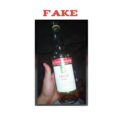Fake Vodka is counterfeit alcohol that has been produced illegally to look like the original product. Fake and adulterated alcohol products are a major problem across the globe especially when it comes to expensive brands. The Markets are saturated with fake alcoholic drinks professionally counterfeited to look like the original. Fake alcohol is pretty much exactly what it sounds like: a bootleg distillate, very often sold as if it were legally produced. They can produce similar effects to ethanol in terms of making you feel tipsy. But they are also potentially very dangerous.
Commonly-used substitutes for ethanol include chemicals used in cleaning fluids, nail polish remover and automobile screen wash, as well as methanol and isopropanol which are used in antifreeze and some fuels. Methanol is often deliberately added to alcoholic beverages as a cheaper alternative to ethanol, which is so-called normal alcohol that can be consumed, according to the Methanol Institute. Drinking just 25 to 90 milliliters of methanol can be fatal without proper medical treatment.
Fake vodka symptoms You should know
Consuming counterfeit Vodka can produce the following symptoms;
Nausea and Vomiting. Nausea is an uneasiness of the stomach that often accompanies the urge to vomit after drinking fake Vodka. Consumers of Fake Vodka often throw up (Vomit). However, it should be noted that consuming any type of alcohol in excess can lead to a host of hangover symptoms, including throwing up. Vomiting is your body’s response to excess toxins from alcohol in your body. While vomiting may make you feel awful, the risks from excess toxins can be damaging to your system.
Abdominal pain. This means that you feel pain in more than half of your belly after drinking fake Vodka. This type of pain is as a result of Methanol toxicity or poisoning from fake spirit. It should be noted that any inflammation that affects the small or large intestines, kidneys, appendix, spleen, stomach, gallbladder, liver or pancreas can cause abdominal pain.
Permanent blindness. Methanol, a substance which can be used in fake vodka, may cause permanent blindness. Permanent blindness is the permanent loss of sight, whether it be a full or partial loss. People that are fully blind are not able to see anything, including light. However, people that are partially blind can see some things to varying degrees depending on the severity of their blindness.
Drowsiness and Dizziness. Consuming fake Vodka containing methanol is the principal culprit here because it is associated with serious complications like metabolic acidosis, visual disturbances and neurological deficit. The initial symptoms of methanol intoxication include central nervous system depression, headache, dizziness, nausea, lack of coordination, and confusion.
Kidney or Liver problems. Fake Vodka can create problems for the liver and kidney. These organs are important sites of metabolism, detoxification, storage and excretion of xenobiotics and their metabolites, and are especially vulnerable to damage. When the liver has broken down harmful substances, its by-products are excreted into the bile or blood. Bile by-products enter the intestine and leave the body in the form of feces. Blood by-products are filtered out by the kidneys, and leave the body in the form of urine. Having problems in this two important organs means toxins will accumulate. Sufficiently large doses of fake Vodka can cause unconsciousness and death.
Important Information
This information on Fake Vodka is provided as part of our harm reduction efforts. It’s important to note that alcoholism is a real disease. It can cause changes to the brain and neurochemistry, so a person with an alcohol addiction may not be able to control their actions.
Alcohol addiction can show itself in a variety of ways. The severity of the disease, how often someone drinks, and the alcohol they consume varies from person to person. Some people drink heavily all day, while others binge drink and then stay sober for a while. Regardless of how the addiction looks, someone typically has an alcohol addiction if they heavily rely on drinking and can’t stay sober for an extended period of time.
Many people addicted to alcohol also turn to 12-step programs like Alcoholics Anonymous (AA). There are also other support groups that don’t follow the 12-step model, such as SMART Recovery and Sober Recovery.
Regardless of the type of support system, it’s helpful to get involved in at least one when getting sober. Sober communities can help someone struggling with alcohol addiction deal with the challenges of sobriety in day-to-day life. Sober communities can also share relatable experiences and offer new, healthy friendships. And these communities make the person with an alcohol addiction accountable and provide a place to turn to if there is a relapse.






